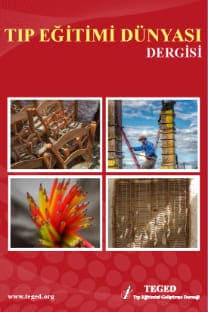Halk Sağlığı Araştırma Görevlilerinin Eğitim Süreçlerini "Mentor" Kavram Ve Yaklaşımı Kapsamında Değerlendirmeleri
COVID-19 Salgını nedeniyle dijital ortamda eğitime geçilmesi sürecinde Hacettepe Üniversitesi Tıp Fakültesi’nde mezuniyet öncesi düzeyde yüzyüze yürütülen kuramsal ve uygulamalı eğitimler durdurulmuş ve yeni çözümler geliştirilmiştir. Acil uzaktan öğretim koşullarında öncelikle tüm kuramsal dersler (1494 ders) kayıt altına alınarak bir öğrenme yönetim sistemi üzerinden öğrencilere ulaştırılması için Tıp Fakültesi Destekleyici E-Öğrenme Programı tasarlanmıştır. Bu program içinde çeşitli çevrimiçi eğitim kaynakları da sağlanmıştır. Bir çevrimiçi sınav modülü satın alınarak bu dönemde 132 sınav gerçekleştirilmiştir. Mezuniyet sonrası düzeyde eğitimlerin sürmesi için her anabilim dalına bir sanal sınıf oluşturulmuştur. 2020-2021 akademik yılında uzaktan eğitim koşulları zenginleştirilerek uygulamalar sürdürülecektir. Bu dönemde kayıt altına alınan dersler artırılmış, eşzamanlı çevrimiçi küçük grup tartışmaları ve paneller planlanmış, standart hasta görüşmeleri ve çözümleme oturumları çevrimiçi olarak düzenlenmiş, hasta güvenliğine yönelik bir sanal gerçeklik eğitim modülü geliştirilmiş, ilk üç yıldaki öğrencilerin beceri eğitimlerinin çevrimiçi yürütülebilmesi için Bireysel Klinik Beceri Eğitimi Seti tasarlanmıştır.
Anahtar Kelimeler:
tıp eğitimi, çevrimiçi öğrenme, uzaktan öğrenme, COVID-19, pandemi
Public Health Residents’ Evaluation Of Their Training Process Within The Scope Of “Mentor” Concept
While passing through a digital teaching environment because of COVID-19 Pandemic, Hacettepe University Faculty of Medicine paused all face-to-face theoretical and practical training at the undergraduate level, and developed new solutions. Medical Faculty Supportive E-Learning Program was designed to provide the students with the recorded theoretical sessions (1494 lectures) through a learning managent system in the emergency remote teaching circumstances. Various online learning resources were also provided in this program. An online examination module was bought, and 132 examinations were conducted during that period. Virtual classrooms were organized for each department to ensure the sustainability of graduate medical education. Distance education will be maintained through the enriched educational circumstances in 2020-2021 academic year. The number of recorded lectures have been increased, online synchronous small group discussions and panels have been planned, standardized patient encounters and debriefing sessions have been remotely organized, a virtual reality training module has been developed for patient safety, and Individual Clinical Skills Training Kit has been designed to conduct online skills training for the first three year students.
Keywords:
medical education, online learning, remote learning, COVID-19, pandemic,
___
Ferrel MN, Ryan JJ. The impact of COVID-19 on medical education. Cureus. 2020;12(3): e7492.Hodges C, Moore S, Lockee B, Trust T, Bond A. The difference between emergency remote teaching and online learning. EDUCAUSE Rev. 2020. https://er.educause.edu/articles/2020/3/the-difference-between-emergency-remote-teachingand-online-learning. Son erişim tarihi: 13 Eylül 2020.
Tolu LB, Feyissa GT, Ezeh A, Gudu W. Managing resident workforce and residency training during covid-19 pandemic: scoping review of adaptive approaches. Adv Med Educ Pract. 2020;11:527-535.
- ISSN: 1303-328X
- Yayın Aralığı: Yılda 3 Sayı
- Başlangıç: 2000
- Yayıncı: Tıp Eğitimini Geliştirme Derneği
Sayıdaki Diğer Makaleler
Tahir Metin Pişkin, Ali Ceylan, Dilek Aslan, Gamze Çan
Ahmet Ergin, Bekir Büyükakın, Selim Kortunay, Ali İhsan Bozkurt
Tahir Metin Pişkin, Ali Ceylan, Dilek Aslan, Gamze Çan
Ölçek Geliştirme Çalışmalarında Temel İlkeler
Araştırma Görevlisi Dr. Fatma Yeşim KARAKOÇ, Prof. Dr. Levent DÖNMEZ
